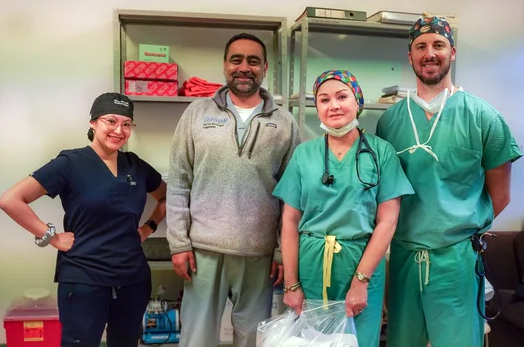GOING GLOBAL
Anesthesiologists in Paraguay
By Kara Mason
October 2023
Two School of Medicine anesthesiologists traveled to Paraguay in June to offer their help and expertise for a week of complex neurosurgeries.
“The local doctors in Paraguay care deeply about their patients,” says Claudia Clavijo, MD, associate professor and neuroanesthesiology section chief in the CU Department of Anesthesiology. “They have fewer resources, but they are very resourceful.”
Clavijo and Jakob Gamboa, MD, a fourth year anesthesiology resident at the CU School of Medicine who became the first global health fellow in the anesthesiology department this summer, traveled nearly 5,300 miles from Colorado to the South American country
with supplies and medication to assist with the neurosurgeries. All patients had complex vascular lesions in their brains, Clavijo says, and had been waiting for their surgeries for a while.

Jakob Gamboa, MD, right, and Claudia Clavijo, MD, middle, pose for a photo while working at Hospital Nacional de Itauguá in June. Photo courtesy of Jakob Gamboa.
“These would be complicated in any country,” Clavijo says of the cases they took on. “But especially when there are limited resources, like there are in Paraguay.”
The duo worked with nonprofit organization Solidarity Bridge, which focuses its medical care partnership efforts in Paraguay and Bolivia. Both CU physicians say the experience is one that was eye-opening, rewarding, and something they hope to continue.
BUILDING BRIDGES
“Every Paraguayan is Colombian and every Colombian is Paraguayan.” That popular phrase describing relations between the two countries continued to ring true throughout Clavijo and Gamboa’s visit. Clavijo, who was born in Colombia, says she felt at home working in Hospital Nacional de Itauguá.
“There was a war at the end of the 1800s where three countries were against Paraguay, but Colombia supported the people of Paraguay in a big way,” she explains. “They are still so kind and grateful for Colombians. It was great to share that connection with the patients and the doctors.”
Gamboa, who has traveled and worked in other Latin American countries, says there was a special bond between the visiting doctors and the locals because they share the same goals and values.
“One of the reasons why we decided to work with Solidarity Bridge is that the organization and the Department of Anesthesiology global health program share the same vision of providing responsible and ethical care that is sustainable and involves partnerships and working together, not just us coming in and doing it ourselves,” he says.
Each year, the organization directly serves nearly 2,000 patients between Bolivia and Paraguay. Some patients receive subsidies and supplies to cover urgent health care needs, while others undergo surgery like they did at the Itauguá hospital. More than half of the patients the organization serves live in rural communities.
WORKING, TEACHING, AND LEARNING
Days typically started before 7 a.m. for Gamboa and Clavijo and lasted well into the night. Beyond working in the operating room, the two also participated in educational presentations to local doctors.
They found plenty of learning opportunities, too.
“We tried to utilize the resources they have in their local hospital and adapt our methods to their capacity to make sure they can keep doing these surgeries long after we leave,” Gamboa says.
Above all, the two doctors say the trip was a success for providing complex care and building lasting relationships.
“It was very important for us to make sure that we were learning how they do things and why before making any recommendations,” Clavijo says. “That was important for collaboration.”
Getting to know the process allowed Clavijo to make recommendations about funding and government allocations for tools, medication, and other necessary resources doctors might need in the future. The two CU doctors say they’d like to return to Paraguay to work further with surgery teams. The department is also expanding its international horizon.
“I’m really excited to keep working as a fellow,” Gamboa says. “I will have time and resources as our department continues to do more global health work. We currently have partnerships in Uganda, Ethiopia, and Guatemala. We want to continue to expand internationally and gain more opportunities to improve health care globally.”